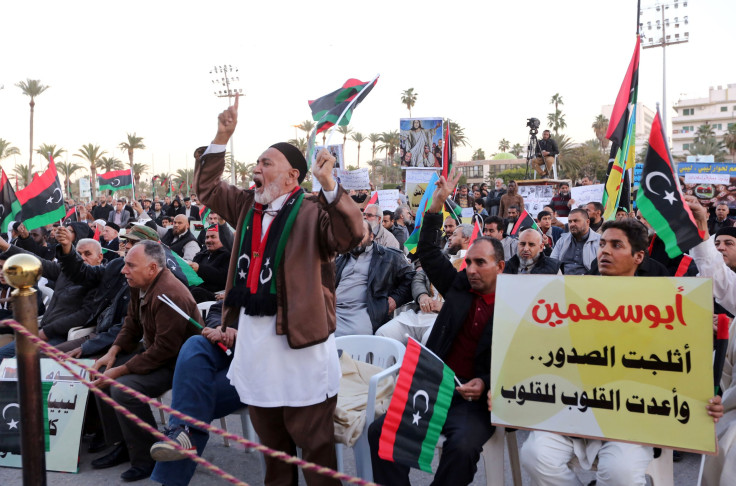Libyans Skeptical Of Libya's New U.N.-Brokered Unity Government Agreement

BEIRUT — After nearly two years of warring political and militant factions, Libya moved one step closer to having a unified political front Tuesday. Libya’s Unity Presidential Council, based in Tunisia, came to an agreement about the formation of a Government of National Accord (GNA) to represent the entire country and announced that it would form a 32-member cabinet, according to the Associated Press.
Though the U.N.-mediated negotiations have come closer than ever before in establishing political unity for Libya, some Libyans remain skeptical about whether this will pull them out of the increasing economic and humanitarian chaos in which they find themselves.
"I think it will do nothing, if not make the situation worse,” said Ahmed, a Libyan activist from Benghazi, who asked to use a pseudonym for security reasons. "Thirty-two cabinets? Does that sounds OK [compared] with the current situation?”
Members will be selected from across the politically fractured country. The official cabinet is set to be announced Saturday, but the proposal has to be endorsed by the House of Representatives, one of two rival governments vying for power in Libya, before the GNA can be implemented.
Ahmed is worried the government corruption that has been commonplace in Libya since the era of former dictator Moammar Gadhafi will become further entrenched in the unity government.
"We learned from the previous four governments that every minister and deputy minister ends up with millions. This government has a [prime minister], nine deputies, 32 ministers, at least 64 deputy ministers, and of course there will be a change in most embassies,” Ahmed said. “So do the math. It will make Libya bleed more money so we end up borrowing from [the] International Monetary Fund.”
But the U.N. remains confident that the agreement is a step in the right direction for the war-torn country.
Martin Kobler, the special representative of the secretary-general and head of the United Nations Support Mission in Libya, declared: "[The accord] is a significant step forward in the quest to end the political divisions and the armed conflict.”
“This is a sterling opportunity for Libyans to come together to build their country. The formation of the GNA is one important leap on the path to peace and stability,” he added.
Despite having lost the capital to the General National Congress rival government last year, the House of Representatives, now based in the eastern city of Tobruk, remains the internationally recognized government in Libya.
“The GNA's opponents will be keeping an eye on its movements and those affiliated with it,” said Adam, a Libyan activist in Tripoli, who asked for his last name not be published, citing a threat to his security. “Its chances of success are slim to none."
Libya’s political chaos has allowed for the rise of several militias on the ground, including some affiliated with terrorist organizations such as the Islamic State group and al Qaeda. The U.N. warned the international community that a delay in political unity for Libya will only allow terrorist organizations to strengthen their hold in the country.
© Copyright IBTimes 2024. All rights reserved.












